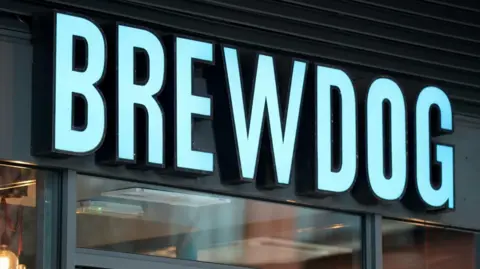The advertising landscape is constantly evolving, and companies often push the boundaries of acceptable marketing practices. Recently, BrewDog, the popular craft beer company, encountered swift backlash when a promotional campaign for its Wingman beer was banned due to concerns over its implications regarding alcohol consumption. The Advertising Standards Authority (ASA) in the UK ruled that the advertisement could mislead consumers into thinking that drinking beer could effectively alleviate feelings of boredom, frustration, or loneliness.
**Ad Content and Implications**
The controversial advertisement featured the slogan: “BrewDog. Always Got Your Back.” It proceeded with a narrative highlighting everyday challenges, such as failures in WiFi connectivity and delays from friends, ultimately asserting that “Wingman? Wingman stands firm.” The ad suggested that having BrewDog’s Wingman beer on hand could serve as both a reliable companion and a remedy for life’s inconveniences. BrewDog’s defenders argued that the advertisement aimed only to convey a message of quality assurance rather than suggesting that the product had therapeutic properties. The ASA received a single complaint regarding the ad, prompting them to investigate.
Despite BrewDog’s assertion that the campaign simply offered reliable quality, the ASA found that the ad’s messaging could be interpreted in a problematic light. The military-themed imagery, including the product’s name and phrases like “always mission-ready,” painted a picture that could be viewed as trivializing serious issues such as loneliness. The ASA concluded that the ad implied that alcohol consumption could serve as a solution for emotional hardships—thus breaching advertising guidelines.
**ASA’s Findings and BrewDog’s Response**
The ASA’s ruling was clear: the advertisement was banned from future use. The authority stressed that BrewDog’s future campaigns should not suggest that alcohol could counteract feelings of boredom or loneliness. A BrewDog spokesperson expressed disappointment in the ASA’s decision, claiming that it did not accurately reflect the intent and spirit behind the campaign. This isn’t the first time BrewDog has faced scrutiny over its advertisements; similar issues have arisen in the past, including an infamous email that suggested its fruity beers could qualify as one of the recommended “five-a-day” servings of fruit.
In one incident in July 2022, BrewDog was reprimanded for their promotional claims regarding fruit-flavored beers. Additionally, the brand faced backlash over a campaign involving a gold-plated can that caused confusion among winners who believed they would receive genuine gold. These issues reflect a pattern of BrewDog’s controversial marketing strategies, which often teeter on the edge of social responsibility.
**BrewDog’s Background and Future Plans**
Founded in 2007 by James Watt and Martin Dickie in Fraserburgh, Aberdeenshire, BrewDog has rapidly evolved from a small craft brewery into a billion-pound brand renowned for its innovative beers and marketing strategies. With over 71 establishments in the UK and additional locations in Dubai, the United States, and Australia, the company’s expansion has garnered significant attention. However, recent announcements regarding the closure of ten of its bars due to financial inefficiencies have sparked concerns, particularly among employees about potential job losses.
In May 2022, co-founder James Watt announced his transition from CEO to a new role titled “captain and co-founder,” suggesting a shift in the company’s leadership dynamics during a challenging phase. As BrewDog navigates through these controversies and operational changes, it remains vital for the company to ensure its marketing reflects responsible messaging regarding alcohol consumption.
**Conclusion**
BrewDog’s recent advertising ban serves as a reminder of the delicate balance advertisers must maintain when crafting campaigns that can be interpreted in various ways. The ASA’s decision emphasizes the importance of responsibly portraying products related to alcohol, particularly in a society increasingly sensitive to issues like mental health and substance use. As BrewDog looks ahead, the brand must earnestly evaluate its approach to advertising, particularly in a climate where consumers are more discerning and regulators more vigilant about misleading claims.











